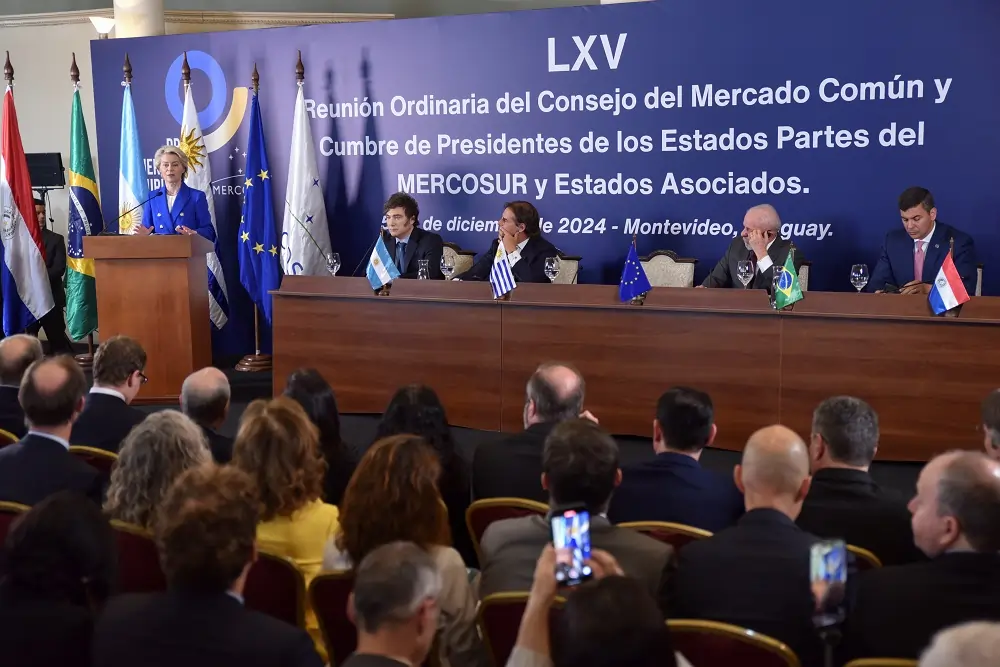Top Stories
Factbox-What’s in the newly finalised EU-Mercosur trade accord?
Published : 2 days ago, on
MONTEVIDEO (Reuters) – The European Union and the South American bloc Mercosur of Argentina, Brazil, Paraguay and Uruguay finalised a free trade agreement on Friday, although it faces a tough battle to secure approval by the 27 EU member states.
The trade deal would be the EU’s largest in terms of the population of its partner and in terms of tariff reductions, which could amount to 4 billion euros ($4.23 billion) annually, phased out over several years.
It is also the biggest deal for Mercosur, which has trade agreements with Egypt and Israel and has signed one with Singapore. The EU sees this as giving it an early-mover advantage.
Following are details of the agreement.
SUSTAINABILITY
Apart from some adjustments to an initial text agreed in 2019, the major change five years later is a commitment to adhere to the Paris climate change agreement with possible suspension of benefits if a party does not do so.
It also commits parties to stop deforestation from 2030 and accept dispute settlement. An adjudicating panel could also rule if policies of one side curb the trade deal’s benefits.
INDUSTRIAL GOODS
The EU will eliminate duties on all industrial goods over a transitional period of up to 10 years.
Mercosur will remove duties for more than 90% of EU exports, including cars (currently 35% duty), car parts, machinery (up to 18%), chemicals and pharmaceuticals (up to 14%). It will also ease access for clothing and footwear.
For electric vehicles and hybrids, the phase-in will be 18 years, though with a cut to 25% from 35% in year one.
AGRICULTURAL PRODUCTS
The EU will liberalise 82% of Mercosur agricultural imports and Mercosur will remove tariffs on 93% of tariff lines for EU exports. For some products, tariff-rate quotas will apply.
The EU will phase in over five years a 99,000-metric-ton quota of beef, with a 7.5% duty. This represents 1.6% of overall EU beef consumption per year. The EU already imports annually about 200,000 tons of beef from Mercosur.
There is a quota for poultry representing some 1.4% of overall EU consumption. The four Mercosur countries together are already the EU’s leading supplier, with Brazil number one, ahead of Ukraine.
There are also EU quotas for pork, sugar, ethanol, rice, honey, maize and sweet corn.
European farmers have repeatedly protested, saying the deal will lead to cheap imports of South American commodities that do not meet the EU’s green and food-safety standards. The European Commission says the EU’s standards will not be relaxed.
There are also potential safeguard measures to address possible market disturbances.
Mercosur will give the EU a duty-free 30,000-metric-ton quota for cheeses (now with 16-28% tariffs), phased in over 10 years, with other quotas for milk powders and infant formula.
Mercosur will also phase in tariff reductions for EU wines (from 20-35% now), spirits (mostly 20%), olive oil, fresh fruit, canned peaches and tomatoes, pork products, chocolate and soft drinks.
Further, the deal recognises 350 geographic indications to prevent imitation of certain traditional EU foodstuffs such as parmigiano reggiano cheese.
RAW MATERIALS
The EU is eager to reduce its reliance on China for critical minerals, such as battery metal lithium, for its green transition, and sees Mercosur as a reliable partner.
The agreement will ensure there are no taxes on the export of most such materials. Brazil will retain some taxes on exports of certain materials, but the EU would benefit from a ceiling on them. For Argentina, all export taxes for minerals are waived.
SERVICES
The deal will address some barriers facing providers such as in telecoms, finance and transport services, even in sectors closed until now, such as maritime services. The EU currently exports about 20 billion euros worth of services to Mercosur.
There are provisions on movement of professionals for business purposes, allowing companies to post managers or specialists in subsidiaries.
The agreement would offer openings in postal and courier services, in telecoms, financial services, e-commerce and international maritime services.
Mercosur will open up some government procurement for the first time.
($1 = 0.9448 euros)
(Reporting by Philip Blenkinsop; editing by Mark Heinrich)

-
Finance3 days ago
Phantom Wallet Integrates Sui
-
Banking4 days ago
Global billionaire wealth leaps, fueled by US gains, UBS says
-
Finance3 days ago
UK firms flag over $1.4 billion in labour costs from increase in national insurance, wages
-
Banking4 days ago
Italy and African Development Bank sign $420 million co-financing deal







